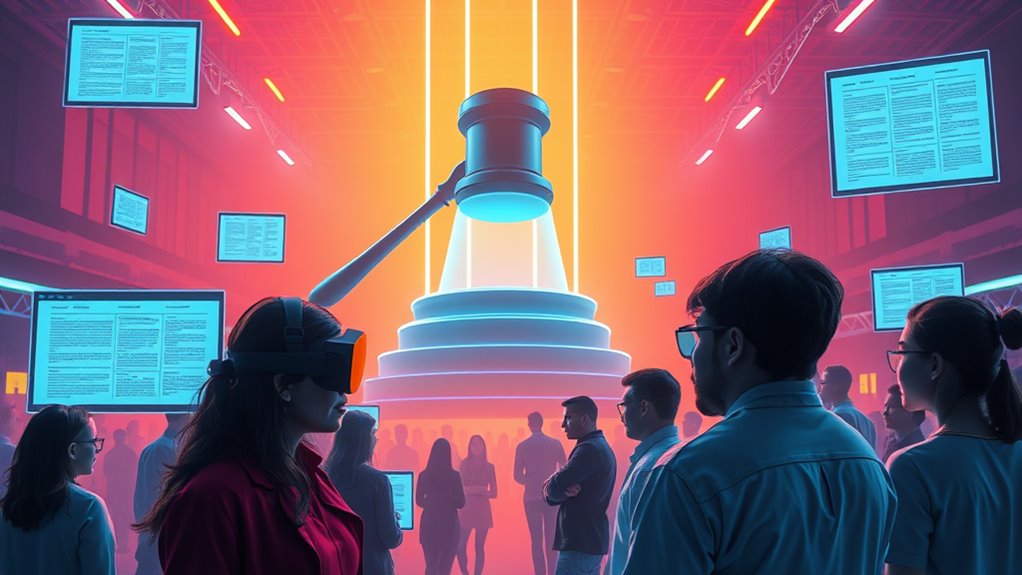
Regulations and Legal Issues in the Metaverse: Understanding the Challenges
The metaverse raises several regulatory and legal challenges, including community guidelines, jurisdictional issues, and intellectual property rights. Jurisdictional uncertainties arise due to the global nature of the metaverse, complicating legal enforcement. Data privacy is a major concern, as extensive user data collection poses risks to individual ownership and security. Additionally, as virtual economies evolve, financial regulations must adapt to prevent financial crimes. Understanding these complexities helps address significant issues that impact users within the digital domain. More insights await those who explore further.
Key Takeaways
- Jurisdictional challenges arise due to global legal disparities, complicating enforcement of laws in cross-border metaverse interactions.
- Intellectual property rights protection is hindered by user anonymity and digital duplication, making enforcement difficult in virtual economies.
- Data privacy concerns persist as users often lack control over their information, highlighting the need for robust legal frameworks.
- Financial regulations are essential to prevent crimes in evolving virtual economies, necessitating international cooperation for effective governance.
- Mental health implications from prolonged virtual exposure require guidelines for healthy usage and consumer education to protect users from potential risks.
General Terms and Conditions in the Metaverse
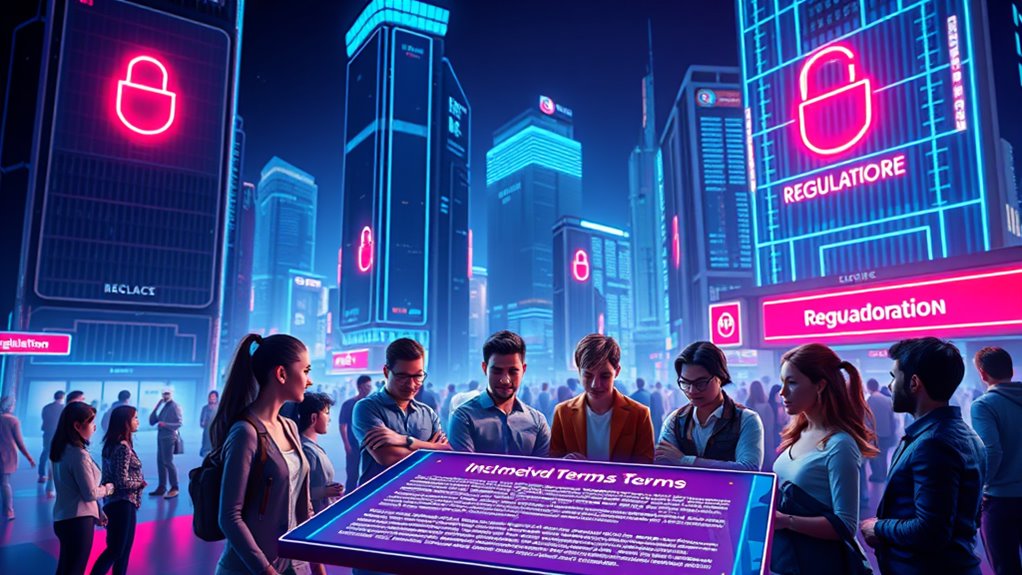
In the ever-evolving landscape of the metaverse, general terms and conditions serve as foundational guidelines that govern user interactions and platform operations. These terms require compliance with existing laws, including data privacy and intellectual property regulations.
Users typically retain ownership of their content but may grant platforms licenses to use it. Community rules are essential to maintaining respectful interactions and protecting intellectual property rights.
Additionally, users must guarantee they meet registration requirements, such as age and accuracy of information, while sharing accounts is generally prohibited. Violating these terms can lead to account termination.
Jurisdiction Challenges and Global User Bases

The Metaverse presents significant jurisdiction challenges due to global legal disparities among users from different countries.
As individuals engage in virtual transactions and interactions, the enforcement of jurisdictional claims becomes increasingly complex, often leading to conflicts between national laws and the need for more unified international regulations.
This situation highlights the urgent requirement for frameworks that can effectively address these disparities while ensuring fair treatment and protection for all users.
Global Legal Disparities
How can legal systems effectively address the complexities of the Metaverse, given its global nature?
The Metaverse presents jurisdictional uncertainty as interactions occur across borders, complicating legal determinations. Currently, there is a lack of international frameworks that specifically address the unique challenges of the Metaverse, resulting in significant legal disparities.
Each country has different regulations affecting how users engage, which can lead to inconsistent governance. Additionally, the rise of virtual asset ownership raises questions about property rights, requiring new legal distinctions between physical and virtual property.
As technologies like blockchain evolve, they further complicate the legal landscape. Without unified standards and international cooperation, effective management of the Metaverse remains a challenge for legal systems worldwide.
Enforcement of Jurisdictional Claims
As the Metaverse continues to expand, challenges surrounding the enforcement of jurisdictional claims have become increasingly prominent.
The traditional concept of jurisdiction based on physical boundaries is often inadequate in this digital space. Activities occurring within the Metaverse lack clear territorial limits, complicating the identification and prosecution of virtual crimes.
Additionally, existing legal frameworks struggle to adapt to emerging technologies like blockchain and NFTs, resulting in inconsistent regulatory approaches. Global platforms demand unified regulations; however, without international cooperation, effective enforcement remains elusive.
To address these challenges, there is a pressing need for harmonized legal frameworks that protect user privacy and security while clarifying jurisdictional claims across various platforms and jurisdictions within the Metaverse.
Intellectual Property Rights and Virtual Assets

In an increasingly digital world, the protection of intellectual property rights within the metaverse has become a critical issue as users create and exchange virtual assets. Copyright, trademark, and patent laws offer some protection for digital works, brands, and inventions.
However, enforcement is challenging due to the global nature of the metaverse, where laws vary by country. Digital duplication complicates the protection of assets, while user anonymity makes identifying infringers difficult.
Emerging technologies, such as blockchain and NFTs, provide innovative solutions for verifying ownership and authenticity. Despite these advancements, a balance must be struck between protecting intellectual property rights and encouraging creativity.
Collaborative efforts are needed to develop flexible legal frameworks that address these unique challenges effectively.
Data Privacy and Security Risks
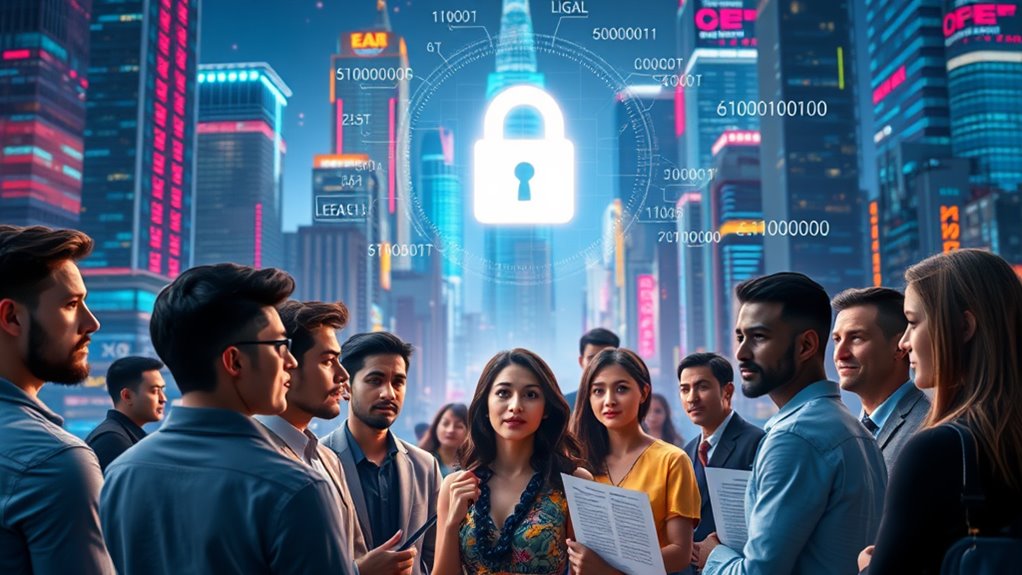
In the metaverse, the extensive collection of user data poses significant privacy risks that challenge existing regulations.
Current privacy laws, while providing a foundation, often struggle to address the unique complexities of virtual environments, leading to gaps in protection.
As the metaverse continues to evolve, the need for updated regulations that effectively manage these privacy concerns becomes increasingly essential.
User Data Collection Risks
User data collection in the metaverse poses significant privacy and security risks that warrant careful consideration.
Metaverse platforms gather extensive data, including user activities, preferences, and even physiological responses like facial expressions. This data collection raises concerns about ownership, as users often lack control over their information, which may be monetized without consent.
Moreover, the misuse of collected data for targeted advertising or third-party sales can lead to exploitation and surveillance. The gathering of data tied to avatars also introduces risks of discrimination based on physical attributes.
Additionally, existing laws are insufficient to regulate this data collection, highlighting the need for specific legal frameworks to safeguard user privacy and security in the metaverse environment.
Privacy Regulation Challenges
The complexities of user data collection in the metaverse highlight significant privacy regulation challenges that need to be addressed. Current regulations, such as the General Data Protection Regulation (GDPR), do not adequately cover the unique aspects of the metaverse, requiring new laws.
The decentralized nature of these platforms leads to inconsistent data protection measures, while cross-border issues complicate compliance with multiple legal frameworks. Moreover, the use of blockchain technology poses challenges, as it does not support data deletion, conflicting with users’ rights.
Additionally, security risks arise from the collection of diverse personal data types and the vulnerability to cyber-attacks. As the metaverse expands globally, a unified approach to privacy regulation is essential to safeguard user data effectively.
Financial Regulations in Virtual Economies
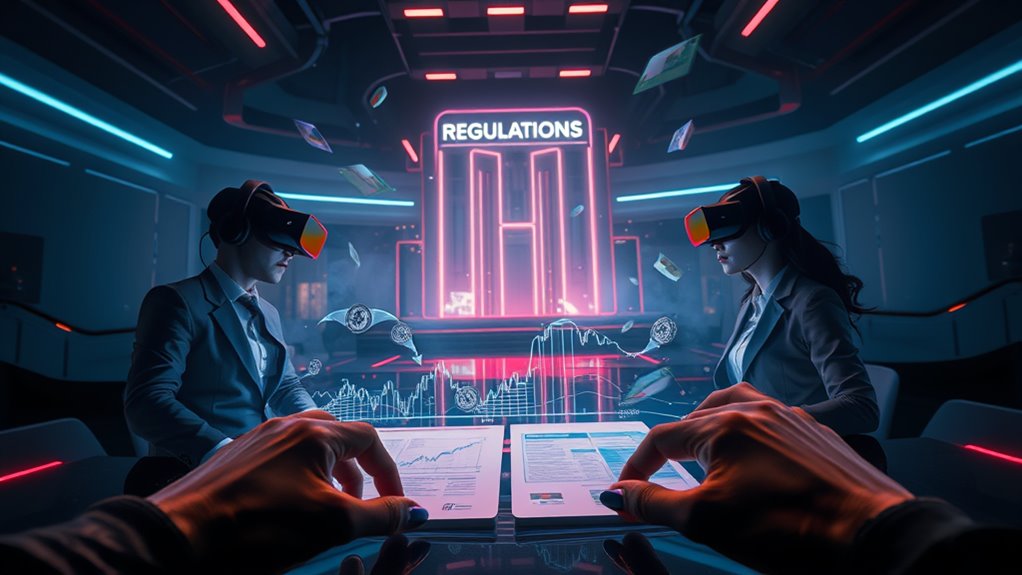
Financial regulations in virtual economies are increasingly important as the digital landscape evolves and expands. Traditional banking roles are adapting, providing certainty of settlement and liquidity while ensuring compliance with emerging regulations.
However, the lack of centralized authorities complicates enforcement, leaving virtual environments vulnerable to financial crimes like money laundering. Additionally, jurisdictional conflicts arise as the metaverse transcends physical borders, creating challenges for legal transactions.
Banks must incorporate advanced technologies, such as blockchain, to maintain competitive advantages and manage risks effectively. The need for international regulatory harmonization is essential to address these issues, ensuring safe and fair practices in virtual economies. As crypto regulations evolve, they will play a crucial role in shaping the financial frameworks of these virtual spaces.
Social and Ethical Considerations in User Safety

As the Metaverse continues to grow, social and ethical considerations regarding user safety take on increasing importance. Harassment in virtual environments necessitates strong monitoring systems, community guidelines, and user education to foster respectful behavior.
Just as real-world laws address threats, regulations in the Metaverse must adapt similarly. The implementation of AI and human moderators is essential for detecting and mitigating harmful actions, while user reporting tools can further enhance safety.
Additionally, prolonged exposure to virtual spaces raises concerns about digital addiction and mental health, leading to social isolation and diminished social skills. Establishing guidelines for healthy usage is vital in managing these risks and ensuring a balanced interaction between virtual and real-world experiences.
Future Regulatory Frameworks for the Metaverse
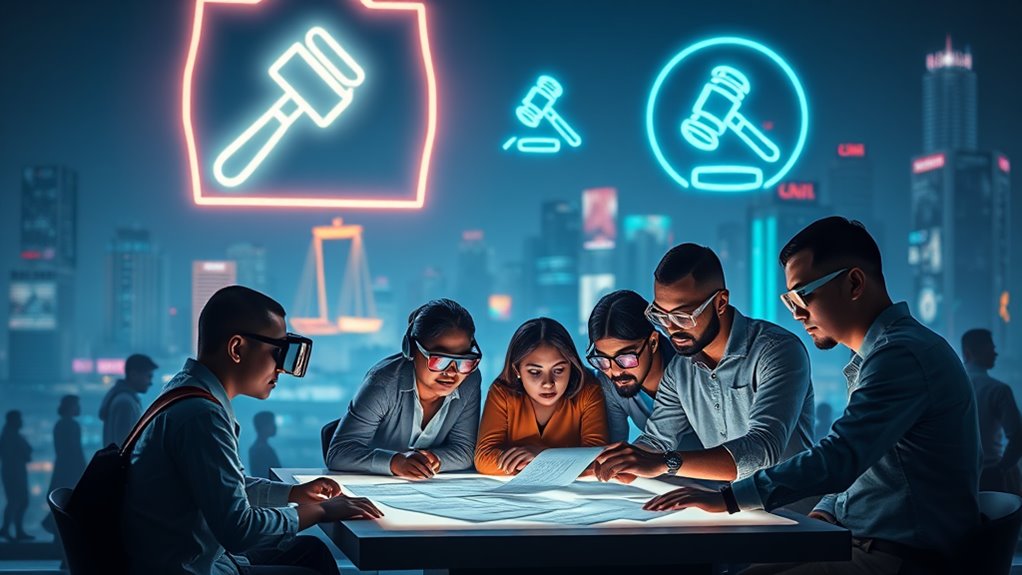
How can effective regulatory frameworks be developed to support the evolving landscape of the Metaverse? Developing these frameworks requires addressing existing gaps, such as unclear legal structures and insufficient data privacy regulations.
Policymakers, like those in the European Commission, are initiating efforts to establish clearer standards. Utilizing technology, such as blockchain, can enhance transparency and compliance efforts while guaranteeing user trust.
Additionally, establishing rules for intellectual property rights is crucial, as creators need protection for their digital assets. Encouraging interoperability between platforms can further promote a cohesive environment.
Finally, consumer education must be prioritized to safeguard users from scams and guarantee safe interactions, creating a balanced ecosystem that supports innovation while protecting individual rights.
The Role of International Cooperation in Regulation

What role does international cooperation play in the regulation of the metaverse?
International cooperation is crucial for addressing the complex challenges posed by the metaverse’s global nature. Without a central authority, different countries face jurisdictional issues and inconsistencies in regulatory approaches.
Key aspects include:
- Creation of New Treaties: Existing international laws are inadequate for the unique challenges of the metaverse, necessitating new regulations.
- Harmonization of Standards: Collaborative efforts can establish international standards to guarantee interoperability and protect digital rights.
- Protection of Rights and Security: Global cooperation is imperative for safeguarding user privacy, intellectual property, and addressing cybersecurity threats within the metaverse.
Such cooperation can lead to more effective governance and a safer digital environment for all users.
Frequently Asked Questions
How Can Users Protect Their Virtual Assets Legally?
Users can protect their virtual assets legally by understanding intellectual property rights, utilizing blockchain technology for ownership verification, adhering to licensing agreements, and staying informed about relevant data protection laws and jurisdictional issues within the metaverse.
What Happens if a Platform Changes Its Terms Unexpectedly?
When a platform unexpectedly changes its terms, users may face disputes regarding contract enforcement and asset ownership. Without clear legal standards, resolving these issues becomes complicated, often leading to uncertainty and potential loss of user rights.
Who Is Liable for User-Generated Content in the Metaverse?
In the vast digital universe of the metaverse, determining liability for user-generated content is akin to traversing an intricate maze; platforms enjoy immunity under Section 230 unless they actively participate in creation, complicating accountability considerably.
Are There Age Restrictions for Using Metaverse Platforms?
Age restrictions for metaverse platforms vary, with many requiring users to be at least 10 years old. Parental supervision is mandatory for younger users, and content filtering is implemented to guarantee age-appropriate experiences.
Can Users Sue for Harassment That Occurs in the Metaverse?
In a digital Wild West, users can indeed sue for harassment in the metaverse, as psychological harm can lead to civil lawsuits, though complexities surrounding jurisdiction and evidence collection pose significant challenges to such claims.
Conclusion
As the metaverse expands like an intricate digital tapestry, it brings forth a myriad of regulations and legal challenges. The interplay of jurisdiction, intellectual property, and data privacy creates a complex landscape that requires careful navigation. Future regulatory frameworks must evolve alongside technological advancements to protect users and promote fairness. International cooperation will be essential in crafting effective solutions, ensuring that this virtual world remains a safe and thriving space for all participants.














